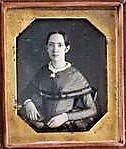
Previously in the novel: War Secretary Stanton holds the Lincolns captive under guard in the White House basement. Janitor Gabby Zook by accident must stay in the basement too.
This makes him witness to conversations he doesn’t want to hear.
Lingering at the corner of the crates and barrels, Gabby watched Mrs. Lincoln pick up the picture frame, focus her small brown eyes on it, and turn a bright scarlet. Her cheeks puffed out. Lincoln stopped when he saw his wife staring at it. Gabby knew yelling was about to begin, and his stomach tied into knots. He lost his appetite for his fried eggs. The air in the basement room became hotter and thicker. This wasn’t any of his business, but Gabby had to listen to it. He had no place to go. He was trapped like one of the rats he used to set traps for. Even as scared as he was, Gabby couldn’t help but peek around first stack of crates.
“Oh,” was the only word Lincoln could say. His head went down, and he stuck his hands in his pockets.
“I thought you left this photograph in Springfield.” Mrs. Lincoln’s voice was soft, but intense.
He cocked his head and shrugged. “Looking at it makes me forget for a few minutes about this awful war.”
“Looking at me is supposed to do that.” Her eyes welled with tears. “I’m your wife. I’m supposed to give you comfort. But it seems you don’t want any comfort from me!”
What kind of picture would provoke Mrs. Lincoln to such anger, Gabby wondered as he peered around the crates. The frame was small, perhaps three by five inches, not ornate but plain. Could it be a photograph of their first child who died? Shaking his head, Gabby decided that was not it. He would be very happy to have picture of his father, and no one could get mad for him having it.
Lincoln awkwardly tried to but his long arms around her tiny body, but she jerked away in holy indignation.
“You promised me you wouldn’t bring it.” After a cold moment of silence, Mrs. Lincoln flung the picture across the room.
Gabby’s eyes widened as Lincoln scrambled to pick up the frame, running his bony fingers over it, to check to see if the glass had broken. Lincoln returned it to his coat pocket and walked slowly to his wife.
“She was only a child. And now she’s dead.” Lincoln’s voice almost cracked. “She’s not a threat to you.”
“Not a threat!” Mrs. Lincoln’s face twisted. “That trollop has tormented me through my entire marriage!”
“Don’t call her that.” Lincoln’s hand impulsively reached to the pocket holding the photograph. “She was a sweet, innocent child who encouraged my dreams.”
“I didn’t encourage your dreams?” Mrs. Lincoln’s hysteria grew.
“I’ve told you; it isn’t even her in the photograph.”
“But it looks like her. That’s why you bought it.” Mrs. Lincoln’s eyes narrowed.
Gabby wondered who the girl in the picture was to create such a torrent of emotions between the Lincolns. She must have been a former girlfriend of Lincoln. She supported his dreams, Gabby sighed. Joe had encouraged his dreams, and he had supported Joe’s dreams. Joe had died, and all their dreams vanished with him. Gabby’s thoughts turned to his sister Cordie. He couldn’t her ever saying anything about his dreams. She was too busy trying to keep a roof over their heads and making sure they had something to eat.
“You’ve never loved me.” Tears rolled down Mrs. Lincoln’s cheeks. “Ann Rutledge won your heart, and she has it still.”
Lincoln took a deep breath, and Gabby expected a reasoned reply from him, but the door opened, and Stanton strode in, breaking the tension. Mrs. Lincoln, wiping her tears away, turned to disappear behind her French lace curtains, barely acknowledging the secretary of war. Shuddering, Gabby retreated further into his corner with his plate of fried eggs. Stanton scared the hell out of him. He cocked his head to eavesdrop.
Monthly Archives: April 2018
Burly Chapter Fourteen

(Previously in the book: For his fifth birthday Herman received a home-made bear, which magically came to life when Herman’s tear fell on him. As Herman grew up, life was happy–he liked school and his brother Tad was nicer. A black family moved into the barn to help them pick the cotton. Mama continued to have dizzy spells. And then one night, when a turtledove got into the rafters, mama died. Papa decided sister Callie should go live with relatives.)
The next day after Callie left, papa got up extra early, roused the boys and took them fishing. Herman couldn’t believe it. Papa mostly took them fishing so they wouldn’t go hungry that night. Maybe Papa was going to make up for the way he’d been acting since mama died, Herman hoped. He and his brother fixed a picnic lunch and jumped into the cab of the pick-up.
Tad eyed Herman closely. “You didn’t bring that stupid bear, did you?”
Herman pushed Burly behind him. “No,” he lied but not very well.
Tad smirked and reached around and pulled out Burly. “Oh yes you did. Don’t try to lie to me, Herman. I know you too well.”
Herman looked down. “I don’t know what it’d hurt, for Burly to come along.”
“Nothing, I guess.” Tad sighed. “Just don’t let papa see it.”
“Don’t let papa see what?” their father bellowed out, glancing over at the two boys.
“Uh oh,” Tad murmured.
“It’s just Burly,” Herman replied bravely, holding up his teddy bear.
“Oh that,” he said with a snort. “I thought it was something you shouldn’t have.”
Herman felt happy—no, that wasn’t the word for it, Herman corrected himself. No one could be happy having just lost their mama and sister in the same week, but Herman did feel peaceful, perhaps hopeful that this new life thrust upon him would not be as bad as he feared.
Papa sat on the bank of the Sulphur River under a tree for hours staring at the water flowing by, not caring if any fish pulled on his line or not. Tad tried very hard to be the good fisherman and catch something for their dinner that night, but he couldn’t keep the bait on the hook long enough. Herman just ran up and down the bank with Burly playing make-believe battles and other wonderful adventures.
It was a happy—no, peaceful and hopeful—day for Herman, but one, as he thought back on it, that was not entirely real because no one spoke. Papa didn’t look at the boys. Tad mumbled to himself about his fishing bad luck, and Herman whispered excitedly to Burly. When they returned home, Herman volunteered to cook supper, which ended up being burnt bacon and eggs, but papa didn’t complain. For once Tad didn’t pick on him. He offered to help him learn how to watch the food on the stove. Finally papa got up from the table with a sigh and went to his room. Herman jumped up, ran over and wrapped his arms about his father’s waist.
“Oh, papa, I love you.” Herman surprised himself because he almost cried before he got the sentence out.
When papa didn’t return the hug but just stood there looking off in the distance, the tears and the reason for them seemed to leave him as the dew disappeared from the grass on a hot summer morning. Herman turned to climb the ladder to the loft. As he was about to undress for bed he heard papa call Tad into his room. Leaning over the edge of the loft Herman could barely make out what papa was saying.
“I’m going to have to rely on you, son,” papa whispered. “You’re beginning to grow up, and all this means you’re going to have to grow up even faster. I’m sorry about that.”
Once again Herman felt a tinge of jealousy because papa loved Tad more than him. His father spoke some more and Tad spoke, but their words were so soft Herman couldn’t understand. A sad pain shot through his body when he saw papa give Tad a long, tight hug. Flinging himself on his bed Herman tried to hold back the tears, but he couldn’t. He held Burly close to him.
“Why doesn’t papa love me anymore?” he asked between the sobs.
“He loves you very much,” Burly replied.
“You keep saying that, but I heard him say that he loved Tad the most. And—and now he won’t even look at me.”
“Do you know why?” Burly asked.
Herman stuck his bottom lip out. “Because he doesn’t love me anymore.”
Burly waited for Herman to blow his nose. “Do you remember why your father said he loved Tad the most?”
Herman thought back. “Because he said Tad looked like him.”
“Have you ever stopped to look at yourself in the mirror real hard?”
“Why no.” Herman wrinkled his brow. He didn’t know what Burly was aiming at.
“Then you don’t know. You’ve never seen it,” Burly said, smiling a little. “You look just like your mother. So does Callie.”
Herman’s eyes widened. “Really?”
“That’s why he sent Callie away. That’s why he’s not looking at you now,” Burly explained. “You and your sister remind him too much of your mother. And he loved her very much.”
“Never think too little of a man’s love for his wife,” Burly Senior said from across the room. “Your father’s love for your mother almost killed him in the last few days. I’d say he’s having a tough time talking himself into living.”
“Gosh, I didn’t know he felt that way,” Herman confessed.
“I feel the same about Pearly,” Burly Senior continued. The only thing that keeps me from being as sad as your father is the fact that I will get to see Pearly again someday. We might even get to live together again.”
“So don’t be jealous,” Burly said. “Times are going to be hard enough as it is without you causing trouble with Tad because you’re jealous.”
So for the next few weeks and months Herman held his tongue and tried to look the other way when papa spoke to Tad and gave him an extra pat on the back. One reward for Herman’s behavior was that Tad seemed nicer. Maybe he knew he was getting special treatment from papa.
“You’re becoming a pretty good cook for a nine-year-old,” Tad said at supper one night near Christmas.
Herman smiled. “Thanks.”
He quickly glanced at papa who was concentrating on his food. Herman could have sworn papa had been looking at him. Sometimes as they worked in the field or as he helped in the barn Herman had the odd sensation papa was staring at him. When he told Burly about it, his little bear smiled.
“He’s coming out of his sadness a little,” Burly said. “Give him more time.”
Ireland and England with Jerry and Josh–Land of Animals, Part One
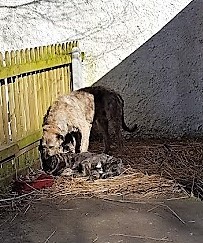
No one should decide on the second day of a nine-day tour of Ireland, Wales and England what their favorite location was, but I did it anyway. Nothing beat the Ring of Kerry near Killarney, Ireland. The ring is an all-day excursion around the perimeter of one of the jagged peninsulas on the west coast of Ireland. The first stop was at the Kerry Bog Village, a restoration of 17th/18th century homes where residents cut blocks of peat out of bogs and dried them to use to heat their houses. Our tour guide said her favorite childhood memory was visiting her grandmother who still burned peat in the fireplace to heat the house. After smelling it, I thought grandma needed to clean the house more often. (Okay, that wasn’t fair. You should have smelled my grandmother’s place out on the plains of Texas. You won’t believe what she used to heat it.)
But the best part of the village was the enclosure where they kept the Irish wolfhounds. You know, they are the size of little ponies and are best to guard all the other livestock who lived there. When I first walked up they were up on their hind feet, staring you in the eye and accepting all the pats and scratches behind the ears they could get. By the time I got my son over to take pictures on his phone, it seems the hounds decided it was break time and they went to the far side of their pen for a mid-morning nap. No amount of cooing, kissy sounds, whistles and sweet entreaties could convince them to come back. No way. Next round of cuddling at the fence began at noon—or whenever—and fans and groupies could come back then. My son got a picture of them on break any way.
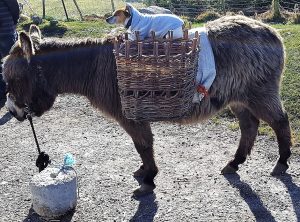
We had not been on the road again for anytime at all when some of the teen-aged girls in the back started going “aww”.
“There’s a dog on the back of a donkey!”
The tour bus driver was a real pro. He knew when people starting oohing over animals on the side of the road he made an unscheduled stop. All the cynical, blasé teens tumbled out of the bus to pet the dog and donkey, who looked bored but used to getting attention from tourists. Even us old people thought they were cute. We got out of the bus and took pictures. A gentleman about my age—meaning he was old, really old—sat on the side with a contented smile and his cap on the ground filled with coins. Several people, of all ages, said the same thing coming back to their seats.
“We can go home now. Once we’ve see the dog on the donkey we’ve seen it all.”
They spoke too soon. The next scheduled stop was only a few miles down the road, a statue of the Virgin Mary on a promontory overlooking an inlet of waves crashing against giant boulders. Scores of birds covered juts of land and islands sunning themselves. This particular statue of Mary was not known for having tears in her eyes, but for actually being observed to move. None of this, however, meant a thing to the people on our bus. As soon as we pulled into the parking lot someone screamed out.
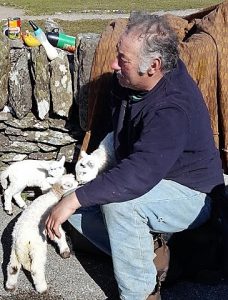
“There’s baby lambs!”
Sure enough, on the outside of the wrought iron fence guarding the statue of the Virgin Mary, was another old man with three or four tiny lambs, not more than a week or two old, scampering around, crawling up into laps and licking as many faces as they could. The only problem was that I didn’t think everyone was going to get to hold a lamb before we were called back to the bus. Being the oldest person there, I resisted knocking children out of the way so I could hold a baby lamb—even though, I must point out in journalistic accuracy, I have never gotten to hold a baby lamb ever in my life. To show I held no misgivings about the turn of events, I did throw a coin in the old man’s hat.
(Author’s note: For the record, I did take a picture of the Virgin Mary statue but decided instead to publish the picture of the lambs. Admit it: you didn’t really want to see a statue of the Virgin Mary. You wanted to see the baby lambs.)
David, Wallis and the Mercenary Chapter Twenty-Six

Previously in the novel: Novice mercenary Leon fails in kidnapping the Archbishop of Canterbury because of David, better known as Edward the Prince of Wales. Also in the world of espionage is socialite Wallis Spencer. Wallis, in quick succession, dumps first husband Winfield, kills Uncle Sol and marries Ernest. In one of their first assignments working separately, they fail to stop the theft of Jessie Donahue’s jewels.
Jessie Donahue sat in the tea pavilion of Cielito Lindo, her Palm Beach mansion, on a late morning of October 1929. She puffed on a cigarette between sips of champagne and black hot coffee, occasionally pausing to nibble at a buttered croissant.
Even in her early thirties, her receding chin was disappearing in crepe-like fat. All the jewels she wore could not hide her frumpy figure. All the latest Paris fashions could not hide the fact she looked like a fishmonger’s wife.
But she found comfort in the fact she did not have to be beautiful. Her father was Woolworth of five-and-dime fame, and it was impossible for her to spend all her money in her lifetime. All her millions could not buy her entry into the prestigious Four Hundred which irritated her like an itch on her back she could not scratch. One thing her money could buy was James Donahue. He was tall, handsome, dark hair, bright blue eyes, a wonderful dancer and a glib conversationalist. He came from a relatively rich family in the fat rendering business. Also, when it came to sexual attraction he held no prejudice against either gender.
Old man Woolworth cried on Jessie’s wedding day. He stopped long enough to walk her down the aisle. Her mother did not object to the marriage; of course, by that time she was institutionalized for dementia. James paid attention to Jessie long enough to give her two sons Wooly and Jimmy.
James, dressed in elegant mauve silk lounging pajamas, finally emerged from their mansion and wandered to the tea pavilion. He plopped in a chair, ignored the coffee and went straight to the champagne.
“Good morning, darling,” he purred with a lazy smile.
Jessie put out her cigarette in a half-eaten grapefruit.
“Jim, you know I adore you. You are a beautiful, delightful creature. You have given me two wonderful sons.”
And I worship you, dearest.”
I don’t mind that you are unfaithful to me. I don’t mind you lose millions gambling each year. Anything to make you happy.”
“I appreciate your tolerance, sweetheart.” He leaned over to peck her cheek. “And I am happy. Deliriously happy.”
Jessie pushed him back and leaned into his face, her eyes narrowing into evil, angry slits. “But I don’t like losing my jewels.”
“Of course, Jessikins.”
“You took them.”
Jim’s mouth fell open as he bit into a croissant. “Why, I thought that detective Noel Scaffa—whatever his name was—took them and pretended to retrieve them from the alleged thief for an exorbitant ransom. He spent six months in prison, didn’t he?”
“He was convicted of perjury, not theft.”
“What difference does it make? He shrugged his broad shoulders. “You got your jewels back.”
“I didn’t get back my blue sapphire. I loved that blue sapphire.”
“Remember, Jessie,” Jim interrupted in a tutorial tone, “it was just a cold, unfeeling stone. It could never love you back.”
“You stole my jewels. You broke my trust and my heart!”
He pulled out a cigarette out of her pack on the table, lit it and took several rapid puffs in irritation. “The Fifth Avenue boys arrive on the noon train. They’re coming over this afternoon for a swim party. I hope you had the pool house cleaned properly. The glass must be crystal clear so the sun can properly heat the water. And I don’t want to be embarrassed if they smell that awful pond scum, or whatever it is.”
“I’ve never had any dirt on my estate in my life and you know it. You always pull that when you know you’re losing an argument. Just because you grew up in a house that smelled of pig fat doesn’t mean there are odors in my house.”
“Whatever. Can I go change now? I bought five new bathing suits and I don’t know which one to wear for the party.” He petulantly blew smoke through his nostrils.
“I want you to obtain new jewels for me,” she continued.
Her voice lowered which made Jim drop his nonchalant attitude and listen.
“Special jewels that will have to be re-cut before I can wear them. No one must know what they really are, but I will know. Perhaps then I will forgive you.” Jessie reached out, took his hand and squeezed hard until he grimaced. “Believe me. For you own safety, you want me to forgive you.”
Snatching his hand away, Jim took a quick gulp of champagne. “And how the hell am I supposed to do that?” He tried to expel a masculine grunt, but it sounded more like a whimper.
“Contact the same organization which stole my jewels.”
He stood and paced about the pavilion. “A special mysterious organization that knows how to get away with crime? You’re delusional.”
“No,” Jessie replied with slow sinister composure. “You’re delusional if you thought you could hide your crime from me. I knew about this organization before we met.”
“You did?” Jim blinked, and his cigarette slipped from his fingers. “How?”
“My father told me about it.” She sat back and lifted her double chin. “You don’t think he made all that money selling trinkets, did you?”
“Jessie, darling, I’m sorry.” He began to speak rapidly. “I did it for you. I was being blackmailed. I didn’t want you to be embarrassed by the publicity. I’ll never steal from you again. If a bastard tries to blackmail me, I’ll have him killed. Honest, we’ll work together on it—“
“Shut up, Jim.”
“Yes, dear.”
“So enjoy your little party with the boys; but right after that, make your contacts. I want new jewels.”
“How long do I have?”
“I’m generous. A year. Two at most.” She stood to walk back inside her mansion. Looking over her shoulder, Jessie added, “And pick up your damned cigarette butt.”
Happiness
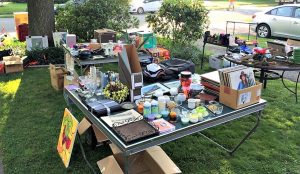
Three days after grandma’s funeral, Jeff began the dreary duty of clearing out her house.
Each room was filled with items bought at yard sales. Jeff knew. Every Saturday for the last three years he had driven his grandmother throughout scattered neighborhoods looking for that one special item that would make her life happy. Usually she found at least two or three items at each sale, and they went to as many sales as they could before grandma had to return home for her afternoon nap.
Stacked on the dining room table were wicker baskets of all sizes and shapes, each one bought to store a specific item.
“This one will be perfect for all the mail that comes in each day,” she told him, “and this one over here will be good to put all the bills in before I mail them out.”
She picked up another basket, saying, “I can put my knitting supplies in this one.”
Another basket was shaped like a swan. “I don’t know what I could put in this, but it is so pretty I cannot pass it up.”
Now all the baskets were dusty as they lay one inside the other. A few had dirty dish towels draped over them, towels which his grandmother fussed about not being able to find. On the floor underneath the dining room table were extra dishtowels grandma had bought to replace the ones she thought she lost.
Jeff walked into the spare bedroom where he began to pack boxes of porcelain figurines, some of Greek goddesses and some of colonial ladies, all of them slightly faded and chipped. If he closed his eyes he could still hear the joy in her voice as she cooed over her discoveries. He even remembered the twinkle in her eyes and the way her bony fingers danced across the porcelain.
It was not that he begrudged the time he spent taking his grandmother from yard sale to yard sale. She had been kind to him when he was a child, and his parents seem to care more about their careers in retail sales. Both of them went from major store to major store– Sears, Ward’s, JCPenney and many others– working long hours for little appreciation and even less income. But grandma always make sure he had all the attention he wanted or needed.
As his grandmother grew older and needed help getting around, Jeff realized the job would be left up to him because his parents still thought one day they would be rewarded for all their loyal service to the big retail stores. So every afternoon after he had spent the day teaching middle school English, Jeff went to his grandmother’s house to see what she needed. Most times she had the local newspaper spread open to the section about yard sales and was planning her route for the weekend.
Jeff sat next to her, pen and pad in hand, to take careful notes. After three years he had every neighborhood in town memorized.
“What I really need,” she confided in a whisper, “is a new bathrobe.”
Jeff just smiled and nodded and wrote it down on his pad, even though he knew his mother had given his grandmother a new bathrobe for Christmas which she had bought on sale at Sears.
After he had packed all the porcelain figurines in bubble wrap and placed them in boxes, Jeff walked into his grandmother’s bedroom and began to take down from the closet all the dresses and coats she had picked up for only 50 cents or a dollar. He knew the exact prices because many of the clothes still had the price stickers on them.
“What did she think he was buying?” Jeff muttered to himself.
By the weekend, he had all of his grandmother’s possessions organized, priced and ready to go on sale in the front lawn. As usual, he had to do all the work by himself because Saturday was always a busy day for his parents at the store. Besides that, grandma was very specific in her will. All the treasures in her home were left to Jeff to do with as he wished. She knew, as stated in the will, he would benefit greatly financially when he sold them. All Jeff really wanted was to make enough money to pay for the classified ad he had placed in the newspaper.
On Saturday morning Jeff sat in a lawn chair, which still had the sticker on which was written 50 cents.
First to go were the wicker baskets.
“I don’t know what I’ll do with it,” an old woman said while holding up the swan to a young woman standing by her side, “but it’s so pretty I have to have it.”
Jeff sold it to her for 10 cents less than his grandmother had paid for it last year.
“You can never have too many rags,” an old man told a little boy standing by him as he grabbed a handful of the older dishtowels. “They’re good for cleaning up around the garage.”
The towels went for one penny each, and how the man’s eyes twinkle as he counted out carefully each coin.
“You see, Billy, this is how you save money.”
By noon Jeff had sold out of all of his grandmother’s treasures and realized what she had been buying all those years at yard sales. It was the same thing these people had just bought.
Happiness.
Lincoln in the Basement Chapter Fifty
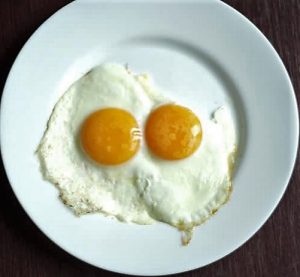
Previously in the novel: War Secretary Stanton holds the Lincolns captive under guard in the White House basement. Janitor Gabby Zook by accident must stay in the basement too.
Jangling keys and the turning of a lock jarred Gabby’s thoughts from the past to his empty stomach and his full chamber pot. Gabby carried it carefully around the crates and barrels, depositing the pot by the door. He waited for Adam and the breakfast tray.
“Private Christy,” Mrs. Lincoln said graciously as she emerged from her French lace curtains. “Good morning.”
Adam kept his eyes down as he put the tray on the billiards table. Gabby could tell he was sinking into melancholia, a place Gabby himself visited many times and for extended periods. If the boy tarried there too long, he might find it hard to return. Gabby frantically tried to figure how to throw Adam a lifeline.
“Is it going to be another sweltering day, Private?” Mrs. Lincoln persisted in her pleasantries. “It’s been absolutely stifling. I’ve been glowing, absolutely glowing.”
“Yes, ma’am,” Adam said in muted tones. “Another warm day.” He avoided eye contact and went to the door.
“I appreciate your kindness, Private. Really I do.”
“Thank you, ma’am.” Adam turned to her and managed a weak smile.
“Father?” Mrs. Lincoln called out after Adam had left, and she had heard the lock clank shut.
The tall, bearded man—who Gabby sometimes thought was president of the United States when he was not certain he himself held that title—walked out of his makeshift bedroom, brushing his shaggy hair away from his brow.
“Now what, Molly?” he asked in a tired voice, which sounded like Adam’s sad, muted tones.
Gabby frowned as he realized the similarities between Adam and Mr. Lincoln—the long, unruly locks and vacant stares. This was a time for him to keep his wits about him, Gabby told himself as he subconsciously brushed his own hair out of his eyes.
“I want you to talk to Private Christy,” Mrs. Lincoln said.
“What about?”
“He seems to be suffering from some malaise,” she replied, walking to the billiards table to look at the tray. “Fried eggs again.” She looked up. “Mr. Gabby, come get your breakfast.”
“Fried eggs again?” His head down, Gabby shuffled toward the table. “I like fried eggs. Eggs taste good. Rooster eggs are best. Once the roosters jump on the back of the hens and pump them then the eggs can become chicks, if we don’t eat them first. Wonder what it is about the rooster’s stuff that makes the eggs taste better?”
“I have no idea, Mr. Gabby,” she replied with reserved disgust. “This isn’t actually a proper topic for conversation.”
“Do you know if these are rooster eggs?” he asked, ignoring her comment. “I guess you don’t since you haven’t been out of this room for almost a year. I haven’t been out of this room for almost a year, almost a year without Cordie. Cordie doesn’t like fried eggs. She doesn’t like the runny part—”
“Mr. Gabby.” Closing her eyes, Mrs. Lincoln firmly grasped his hands. Her voice was frantic, but soft and fragile. After inhaling deeply, she continued. “I’m so glad you like fried eggs.”
“You can have mine,” Lincoln offered.
“No, thank you, sir.” Gabby examined Lincoln’s loose-fitting suit. “You need to eat all you can get your hands on. You’re a bag of bones. I haven’t seen a bag of bones like yours since my father died.” Responding to the sudden squeeze on his hands from Mrs. Lincoln, he stopped. After looking at each of them, he took his plate. “I think I better eat my breakfast now.”
Settling on the floor behind the crates and barrels, Gabby began to eat, his head slightly cocked to hear the conversation between the Lincolns.
“I wish he’d taken the fried eggs,” Lincoln said, a hint of humor shading his voice. “Do you want them?”
“Heavens no!” Mrs. Lincoln replied. “I keep telling Private Christy I prefer poached eggs, but I suppose my poached eggs go to that woman upstairs.” She paused to sip her coffee. “Mr. Gabby’s right, you know. You’re too thin. You should eat more.”
Gabby smiled with pride as he wiped dribbled egg yolk from the corner of his mouth. Mrs. Lincoln knew he was smart. That colonel at West Point was wrong. He said Gabby was stupid after the accident. He said West Point never made a mistake. Stupid people get people killed, the colonel said. But Mrs. Lincoln did not think he was stupid.
“Father,” Mrs. Lincoln announced, “I was wrong to think being locked up in this basement was the worst thing that could happen to a human being.”
Her remark shook Gabby. He did not want her to be wrong about something. Mrs. Lincoln thought he was smart, and he did not want her to think she made mistakes.
“I’ve concluded it’s much worse to be the guard at the door,” she continued. “At least we’ve the peace of mind of knowing we’re sinned against. How horrible to live knowing you are the sinner.”
“Mother.” Lincoln paused to sigh. “You’re too profound for this early hour of the morning.”
“It’s Private Christy, Mr. Lincoln,” she persisted. “His appearance, his demeanor. He knows he’s a sinner—an innocent sinner compared to that devil Stanton, but a sinner all the same—and that terrible knowledge is killing his soul.”
“You expect me to save his soul?” Lincoln muttered. “My dear, I’m not divine.”
Gabby’s head turned as he heard the door unlock. Adam came sooner and sooner every day for the breakfast plates, Gabby grumbled. He stuffed an entire bran muffin in his mouth. Soon he would not have time even to finish his eggs. Gabby stood to take his plate to the billiards table. Adam gathered the others, accepted Gabby’s plate, mumbled thank you, and turned away. Gabby noticed Mrs. Lincoln nudging her husband.
“Say something,” she whispered.
Lincoln scowled at her, then turned and forced a smile on his face. “Son, do you like licorice?”
“What?” Adam stopped on his way to the door, startled.
“Licorice. Do you like to suck on it?”
“Licorice?” Mrs. Lincoln said, hissing at her husband under her breath.
“I suppose. I ain’t had much.”
“Well, then, let me give you some.” Lincoln walked toward him, patting his pockets. When he pulled out a white paper wrapping the licorice, a small framed picture fell to the floor.
“Thank you, sir,” Adam said, taking the candy and leaving.
Burly Chapter Thirteen
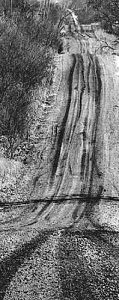
(Previously in the book: For his fifth birthday Herman received a home-made bear, which magically came to life when Herman’s tear fell on him. As Herman grew up, life was happy–he liked school and his brother Tad was nicer. A black family moved into the barn to help them pick the cotton. Mama continued to have dizzy spells. And then one night, when a turtledove got into the rafters, mama died.)
When he awoke the next morning he heard a woman’s voice in the kitchen. It sounded like his mother’s voice. Herman looked across the loft to see Tad in his bed, and he heard a soft moan from behind the sheet where Callie slept. Did he dream his mother died last night? Was it all just a terrible nightmare? Herman hoped it was and crawled to the edge of the loft to peek over. His heart sunk when he saw his Aunt Joyce—his mother’s sister—in the kitchen and her husband, Uncle Calvin, sitting at the kitchen table sipping coffee.
Aunt Joyce looked up and saw Herman. She smiled and said, “Hello, little boy. Come on down, and I’ll fix you some breakfast.”
Aunt Joyce looked very much like mama except she was heavier and had rosier cheeks. Her hair was streaked with gray and there were deep lines by her eyes and mouth.
“Have a good night’s sleep?” she asked softly, putting a bowl of oatmeal in front of him.
Herman took a couple of bites then looked up. “It’s real, isn’t it?”
Aunt Joyce looked at her husband and then directly into Herman’s eyes. “Yes, little boy. Your mama’s dead. Your papa’s still asleep in there. The doc gave him quite a shot last night to put him out, I understand. Your Uncle Calvin and I drove in from Texarkana when the sheriff called last night. We’ll stay to help out until after the funeral.”
Uncle Calvin cleared his throat. “And, of course, I’ll help the coloreds and you kids with bringing in the cotton. I don’t think your papa will be able to work the field, according to what the sheriff said. The last think he needs now is to lose the cotton crop.”
So it was work as usual for Herman, Tad and Callie that day, with Uncle Calvin and the Johnsons out in the field picking cotton. At lunch Mrs. Johnson told no stories and sang no songs. Even Tad kept quiet. Every now and then Callie would come over and give Herman a hug. When they came in for supper, papa’s bedroom door was still shut. The children had just finished eating when papa came out wearing his Sunday suit. Herman would have ordinarily smiled and told his papa how handsome he looked, but tonight he said nothing. Papa’s eyes told him to say nothing.
“Do you want to eat anything, Woody?” Aunt Joyce asked softly.
“No.”
“Are you sure? It’s been since yesterday you put anything on your stomach.”
“Maybe later.” Then he left the house.
“Your papa’s going into town to the funeral parlor to pick out a coffin,” she announced as she cleared away the dishes.
The children were in bed when papa returned that night. He dropped into a chair by the kitchen table while Aunt Joyce fixed him a bowl of soup. Herman looked down at him and felt sorry for his papa. He was about to cry again.
“Go down and tell him how much you love him,” Burly whispered.
And Herman did. Without a word he crawled into his father’s lap and hugged him. “I love you, papa,” he said in a tiny, tear-choked voice. He waited a moment, hoping for those long, stringy, strong arms to enfold around him, but they didn’t.
“Joyce, get him to bed,” papa ordered, not looking at Herman.
Aunt Joyce rushed around the chair and guided Herman back to the ladder. “I think it would best to leave your papa alone for the next few days,” she whispered.
She hugged him and kissed him. While it felt nice, Herman decided it wasn’t the same as one of papa’s strong embraces.
The long day in the field, the hot sun and the aching back from leaning over the cotton plants were almost a relief for Herman, because the work took his mind off how his world was changing. The funeral—Aunt Joyce told him—would be the next day. Herman wished it was already over.
In the small church all their friends and neighbors gathered. The family approached the coffin to view mama for the last time. Papa completely collapsed, screaming and crying. Herman wished he hadn’t taken on so. Callie wept as she gripped Herman in her arms. Tad simply stood there, without a tear or showing any emotion. Herman thought that was strange until he realized he was doing the same thing. He wondered if Tad were thinking the same about him. Finally the day was over, and the next was life as usual, picking cotton with the hired hands. Except instead of papa, Uncle Calvin was the boss.
Uncle Calvin was a nice man who seemed to take life easier than papa. When Callie was whispering more than she was picking, Uncle Calvin simply said, “Let’s pick that cotton before it rots.” Papa would have barked an order while glaring at her. Instead Uncle Calvin just smiled and winked.
By the end of the week the crop was picked, and the Johnsons were in their wagon, which was pulled by a pair of gray mules. Before they left, Mrs. Johnson gave Herman one last hug.
“Believe in the Lord,” she whispered. “He will make all things right.” She paused to add, “Now don’t you trouble your little head about that turtledove. That little thing didn’t kill your mama.”
Herman decided life was returning to normal when Tad walked up and scolded, “Didn’t I tell you not to let that woman touch you?”
“Now, Tad,” Uncle Calvin said, patting him on the shoulder, “she didn’t do any harm.”
Tad knocked his hand away. “You’re not my papa.”
Uncle Calvin backed off and looked down. “No, I guess I’m not.” Then he walked to the barn.
Callie looked Tad in the face. “You didn’t have to be mean to him. He’s been good to us. Aunt Joyce too.”
Tad glared at his sister as though he was going to say something nasty, but instead he ran as hard as he could through the field and into the woods. Callie smiled at Herman and hugged him.
“Don’t worry about Tad. He’s taking it hard now, but he’ll get over it. No, don’t you worry. We’ll make it just fine. We’ll make it because we’re a family and we love each other. Down deep we really do.”
Herman smiled a moment and then frowned when he remembered why Tad had yelled at him in the first place. “Is it wrong to let Mrs. Johnson touch me?”
Callie shook her head. “Of course not.”
Herman was confused. “Then why does she want to touch me?”
Callie hugged him again. “Why do I want to touch you?”
“Because you love me.” Herman paused. “Does Mrs. Johnson love me?”
Callie looked down the road at the wagon as it disappeared on the horizon. “I think she has enough love in her for every child she meets.”
Feelings of motherly love began to flow from Callie to Herman. Yes, Herman told himself, Callie was growing up right before his eyes and was going to help take the place of mama. His hopes didn’t last long. When he and Callie walked into the house he saw papa and Aunt Joyce sitting at the kitchen table in deep conversation. She was telling him something, and he was shaking his head. When they saw the children, they stopped. Aunt Joyce smiled, but papa just stared off into space.
“You better tell her now,” papa said.
Aunt Joyce extended her arm. “Come here, Callie dear.” She hugged Callie, pulled her away to stare into her eyes. “Your papa’s decided it would be best for you to come live with your Uncle Calvin and me.”
“For how long?” Callie asked cautiously.
Aunt Joyce glanced at papa and then back at Callie. “Well, until you grow up. You see, your papa doesn’t think he can do a good job of raising a girl as she’s becoming, well, a young woman, so he wants me to do it.”
Callie took a step toward her father. “Papa?”
He looked away. Finally Callie turned to go to the loft. She looked back. “When do we leave?”
Aunt Joyce smiled. “Today. As soon as you pack.”
Callie slowly climbed the ladder, followed by Herman. Once at the top Herman grabbed her around the waist and whispered, “I don’t want you to go.”
She hugged him back. “I don’t want to go, but once papa makes up his mind there’s no arguing with him.”
Tears began to fill Herman’s eyes. “It was bad enough to lose mama, but to lose you too….” His little voice just went away.
“It’s not like we’ll never see each other again,” Callie said, trying to be cheerful. She piled her clothes and belongings in the middle of her sheet and tied the four corners. Callie headed for the ladder, but Herman stopped her.
“You forgot Pearly,” Herman said, holding the bear out to her.
Callie smiled. “You can keep her if you want.”
Herman almost agreed but thought better of it. “Don’t you want her?”
“Of course, I want Pearly,” Callie replied. “I love Pearly.”
He stuck the burlap bear in her hands. “Then you take her. I’ve still got Burly.”
Callie hugged him and kissed him on the cheek. “I love you, Herman.”
Herman couldn’t stand to go downstairs to see his sister off. He was afraid he would really cry then. Instead he went to the window by his bed and looked out. He saw Uncle Calvin put their bags into his black Ford sedan. Aunt Joyce tried to hug Tad but he stiffened and pulled away. Callie was not going to be put off, and she grabbed her brother and kissed him on the cheek as he squirmed. Herman saw Callie look up at the window and waved. He couldn’t help it; he cried anyway.
In a few minutes Tad came up the ladder and stormed toward Herman who was drying his tears in the pillow. “You stupid little dummy! Don’t you have any more sense than not to come down stairs to say goodbye to your own sister?” he demanded.
Herman looked up from his pillow, his cheeks still wet from the tears and his eyes puffy and red.
Tad stopped short in his tirade. Sighing, he patted Herman on the shoulder and headed back to the ladder. “You and I will have to take turns cooking now,” he said. “I’ll start tonight.”
Herman rubbed his head in the pillow to finish drying his tears. He felt a scratchy paw on his arm.
“Herman,” Burly said, “now I know how you felt to lose your mother because now I’ve lost mine.”
Hugging his bear, Herman cried, ”Oh Burly, what are we going to do?”
“Keep on loving each other,” Burly replied.
“And keep on loving your father and Tad,” Burly Senior said from across the room. “They’re going to need your love more than ever. And they’ll fight it more than ever too, which is going to make it even harder on you.”
Burly snuggled close to Herman. “But Herman can do it. I know he can.”
Ireland and England with Jerry and Josh — The Trip Over
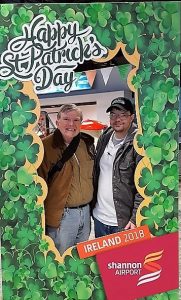
We woke up about 6 a.m. on a Sunday, packed and ready to go. We bathed, ate toast and drank a cup of tea. A friend of my son Josh and a nice lady picked us up in their car for the trip down to Tampa airport. I had a wonderful conversation with the woman. After they dropped us off they were going to the St. Petersburg Museum of Art to see the exhibit on Star Wars costumes. As we were taking our bags out of his trunk I told Josh’s friend that his wife was delightful to talk to.
“She’s not my wife.”
“Well, your friend was delightful to talk to.”
As we walked into the Amelia Earhart door, I hoped the rest of the trip would be less embarrassing. We sat there for the next hour waiting for the rest of our group to show up. I had weaseled our way on a school group tour. We pretended to be chaperones to get a really good price on tickets. My teacher friend who had gotten us on the plane arrived so we started following her around like we were little puppies.
Once we were told which gate we’d be departing from, I asked Josh to get us something to eat. He came back with delicious hamburgers. They were dripping with grease just like the good old days in the fifties and sixties. We were finally off to Newark where we had a four-hour layover before our five-hour flight to Shannon Airport. It was during this leg of the journey I began to feel a bit queasy which I wrote off to turbulence.
We arrived in Ireland at 6 p.m. which suddenly became noon because we were traveling into the sunrise. Josh and I posed for some silly pictures, and my stomach was still grumbling. I hadn’t felt this bad since that Ronald Reagan film festival. (Extra points if you catch the movie reference.) The professional tour guides who met us at the Shannon airport said we’d get over the jet lag faster if we spent the next six hours sightseeing before checking into the hotel, eating and going to bed.
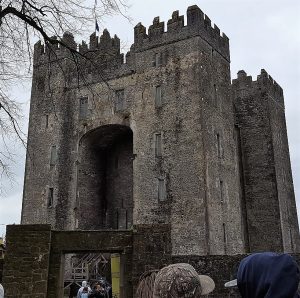
Our first stop was the most perfectly preserved ruin in Ireland, Bunratty Castle. I was very impressed. It was a tall stone sonofabitch. When we first entered the courtyard we became immediately aware of the clatter of sheep bleating and crows cawing. In their own way they were quite charming. As we started up the hill to the castle gate, my stomach stopped feeling queasy and went into four-alarm revolt over that damn greasy hamburger.
I turned off the path, tried to hide behind some bushes which had yet begun its spring foliage and proceeded with a nasty case of the dry heaves. While everyone else climbed the castle steps, I hurried back to the visitor center to find the nearest toilet. Thank goodness it was exquisitely clean.
Eventually I felt better, made it up the castle steps to the main dining hall where the group was hearing a lecture about how awful life was during the Middle Ages. The docent went into particular detail about how narrow, steep and irregular the stairs were. All the better to make the assaulting forces to lose their balance and fall back on themselves. He then invited us to climb another round of godforsaken steps to see the impressive landscape from the battlements.
I had to go back to the gift shop immediately to find another toilet. The second was as clean as the first and I wretched again, hoping this would be the last sick spell of the trip.
We all got on the bus for a trip to Adair, a quaint thatched-roof village, where we were to have lunch. The thought of food made my stomach growl again, but the tour guide suggest fresh mint tea to settle the tummy. She was right, and the tea with freshly crushed mint was soothing. But Josh—who, by the way, has a cast-iron stomach–ordered a breakfast of runny eggs and greasy sausages, the sight of which sent me to the little restaurant’s toilet. Fortunately it also was immaculately clean.
When I came to Ireland I thought I’d have a wonderful time with the wearin’ o’ the green. Instead it turned into the clutchin’ o’ the porcelain.

For our last tourist foray of the day we went in search of authentic live Irish music in an authentic Irish pub in downtown Killarney, which was really, really charming. It had a pub which claimed to be Ireland’s only Lord of the Rings themed pub. Cute but not really charming. I found another nice cup of mint tea and watched all the lovely natives enjoy their afternoon among friends. Nothing related to Lord of the Rings.
My initial intention was to forego dinner at the hotel. Since I had already paid for the food, I went downstairs just to say hello to it. On the plate was a nice slice of roasted turkey with mildly seasoned dressing. After bolstering my constitution with another cup of mint tea, I nibbled away at the turkey and dressing. By the time I finally made it to bed, my mind could not figure out how many hours it had been awake, but my stomach had decided to like Ireland after all.
David, Wallis and the Mercenary Chapter Twenty-Five
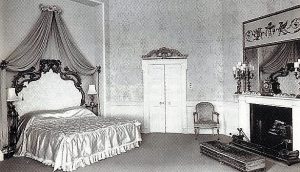
Fort Belvedere bedroom, where all the fun took place
Previously in the novel: Novice mercenary Leon fails in kidnapping the Archbishop of Canterbury because of David, better known as Edward the Prince of Wales. Also in the world of espionage is socialite Wallis Spencer. Wallis, in quick succession, dumps first husband Winfield, kills Uncle Sol and marries Ernest. In the meantime David has an affair with Freda Ward and Thelma Furness. MI6 wants him to seduce Princess Stephanie of Austria.
The next morning they descended the staircase for breakfast. David dressed in casual checkered slacks and a dark turtleneck sweater while Stephanie wore her wrinkled evening gown with pearl necklace. He called the butler aside to give discreet instructions about arranging for a bag of clothing to be brought out to the fort while Stephanie instructed the cook on how she liked her pancakes fixed. After breakfast, while waiting for her clothes to arrive, they walked in the garden.
David paused by the fish pond. “Eventually I’m having that replaced by a swimming pool.” He then nodded to the right. “And over there I’m building tennis courts.”
“Please don’t bother to continue,” Stephanie interrupted. “I am not interested in—how shall I put it—outdoor activities.”
“So you are more interested in pleasures that are available indoors.” He smiled slightly. “I completely understand.”
In the next few days, they enjoyed meals together. Stephanie appreciated how the cook adapted the cuisine to her tastes. The couple spent early evening hours listening to the radio or records and played the game of guessing the names of acquaintances they might share. Late evening hours were filled with intimacies in the master’s bedroom. David stifled a laugh when Stephanie, upon reaching orgasm, screamed out “Seig heil!”
Each morning they slept in later and later until they accepted the reality that their first meal of the day was going to be luncheon. After the servants had left the dining room, David leaned to whisiper, “I think I have surmised your favorite indoor activity.”
“As it is yours, my darling prince.”
He bit into a scone and mumbled, “Perhaps.”
One particular afternoon they lounged about in David’s library. Stephanie ran her fingers across a few of the titles.
“Have you read Herr Hitler’s Mein Kampf?”
“No, I haven’t gotten around to that one yet.”
She turned and smiled. “I can get an autographed copy if you wish.”
At the end of the two weeks, David felt he had accomplished his assignment. He had Stephanie’s complete confidence. He learned that Harold Sidney Harmsworth, first viscount of Rothermere, had a mole on his left buttock which had a long, solitary hair growing through it. She kept insisting Herr Hitler was not as terrible as the rest of the world thought.
“He has a unique sense of humor, that’s all,” she said.
That last night they lay naked in front of the fireplace in David’s bedroom. Well, Stephanie was not completely naked. She still wore her string of pearls, which glistened in the flickering fire light. Her fingers glided across his smooth chest.
“I can tell you are of Aryan blood.” Her eyes softened.
“Yes, my great-grandmother Victoria married Albert Saxe Coberg Gothe.”
Her head went back. “What a glorious name. Why did your family change it to Windsor? That’s a castle, isn’t it?”
“Well, during the recent unpleasantness with Germany, the English people wanted us to sound more English.”
“But when you become king, you can change all that,” she purred. “Think of it, England and Germany, bounded together.”
“You mean bound together, don’t you?” David interrupted.
“What?”
“Bounded together, well, means something entirely different.” His voiced oozed cynicism.
“Oh. You’re such a tease.” Stephanie slapped his bare shoulder. “But if you married a German princess….” Stephanie let her sentence dangle as leaned in to kiss David’s chest.
He tensed. David was not expecting her to press for marriage. He assumed she–and Hitler–would be satisfied with an intimate relationship with possible access to government secrets. The notion of actual marriage presented a new set of complications. He decided he needed the rest of the night to extricate himself from matrimony while maintaining close contact with Hitler’s inner circle.
“Suddenly, I feel fatigued.” David fell back on his pillow and yawned.
They arose early in order to have breakfast before David’s chauffeur drove her back to Mayfair. David eyed her as he took a bite of toast.
“I’ve been thinking about what you said last night.”
“Yes?” Her eyes brightened.
“I think I do want to marry you.”
“Who said I would say yes?” Her voice overflowed with playful mischievousness.
He ignored her question. “Of course, the government would object because you are a divorcee and you have a child from your previous marriage. Then there’s the matter of religion.”
“I have no religion,” she replied flatly.
“There you have it. But that should not deter us. These two weeks have convinced me I am capable of true, profound love. We will marry and say to hell with the rest of the world. I own four thousand acres of ranch land a few miles south of Calgary. We can marry, retire to Canada and raise cattle the rest of our lives. Your son will love it.”
Stephanie’s mouth was agape for a full minute. “Are you serious? You would give up the throne, give up everything to marry me?”
“Of course.” David observed her eyes and knew he had won.
“My dear, foolish prince. I am an important person in my country. I could not disappear to—to Calgary.”
David reached out to clasp her hand. “I suppose you’re right. But we will always remain close, intimate friends, won’t we?”
“Of course.”
He pulled out a tiny stuffed teddy bear from his slacks pocket, put it in her hand and closed her fingers around it.
“This is for you. Always keep it with you. From time to time, pull it out and look at it to remind yourself of the one brief moment when the Prince of Wales was completely sincere.”
The Year the Easter Bunny Slept In

A few years ago children around the world almost didn’t get their eggs to hunt on Easter.
You see, the Easter Bunny worked hard and was proud of the fact he could color all those eggs and distribute them by himself. This was quite a task since each year more and more children expected the Easter bunny to visit them. His wife, commonly known as Mommy Bunny, often offered to help but he was quick to say he didn’t need anyone’s help. Besides, his son, commonly known as Baby Bunny, was so proud of him he didn’t want to share the glory with his wife. The burden, however, wore heavy on him, as was the case with many males who craved to be the sole provider for their family. What Daddy didn’t realized, however, was as he grew older the more tired he became finishing all the Easter eggs. That year the Easter Bunny cracked, so to speak, after painting the last of the eggs and immediately fell asleep from exhaustion. By dawn of Easter morning, he sat slumped against the family tree, snoring loudly with his long floppy ears flapping against his face.
“Daddy Bunny! Wake up! You’ve got to deliver the Easter eggs!” Mommy Bunny frantically jostled his shoulders to no avail.
“Mommy, why is Daddy Bunny sleeping against the tree like that?” Baby Bunny asked as he hopped from the hole under the tree roots which led to their cozy little home.
“He just worked too hard last night getting the Easter eggs ready, darling.” Mommy Bunny smiled nervously at her son before shaking Daddy Bunny one more time. Daddy Bunny! Wake up!”
All Daddy Bunny did was continue to snore, his ears flapping across his face.
“Oh, great,” she muttered. “Now all the children are going to be disappointed. What am I going to do?”
Babby Bunny hopped off a few yards to another hole in the ground. “Oh boy, is this where another rabbit family lives? I want to play with their children!”
Mommy Bunny grabbed him by his tail and pulled him away. “That’s not a rabbit hole, dear.”
“What is it?”
“A snake hole.”
“What are snakes?”
“Dangerous creatures,” she said as she pulled him back to their tree.
“What does dangerous mean?” Baby Bunny asked.
“It means they’re not very nice, and you’re never to go there again. Do you understand me?”
“Uh huh.” Baby Bunny held his head low and avoided looking at his mother.
She knew what that meant. He was going to hop right back to that snake hole the first chance he got. Mommy Bunny couldn’t very well deliver the Easter eggs herself and leave Baby Bunny alone with Daddy Bunny asleep under the tree. When she returned Daddy Bunny would still be snoring while Baby Bunny would be down the snake hole, never to be seen again.
“What am I going to do?”
Just at that moment, a dog loped along the path that came near the tree.
“Mr. Dog! Could you please help me?” Mommy Bunny called out.
“Sure, what can I do for you?” The dog looked at the Easter Bunny snoring under the tree. “Boy, he must be tired after painting all those eggs.”
“The children have to have their Easter eggs, and I can’t leave Baby Bunny here alone with Daddy Bunny. Could you deliver the eggs?” Mommy Bunny asked.
“Sure, why not? It sounds like fun,” the dog replied.
“Hurray!” Mommy Bunny cried out.
“Hurray!” Baby Bunny echoed.
“Hey, why don’t we make it more fun by digging holes in all the yards and burying the eggs? Then the kids could have fun digging them up?”
“I don’t think the parents would find that fun at all,” Mommy Bunny said, wrinkling her brow.
“Then I don’t want to do it. The old way is too boring.” The dog trotted off down the path.
Mommy Bunny hopped back to Daddy Bunny and shook him again. “Wake up! Wake up!”
She heard a clippity clop coming down the path and looked to see a donkey.
“Mr. Donkey! Mr. Donkey! Will you please help me?”
The donkey ambled over to the tree. “Sure. What do you want?”
“Will you please deliver the Easter eggs? Daddy Bunny is,” she hesitated as she looked down to see the long ears rhythmically flap over his face, “tired, way too tired.”
“He painted Easter eggs all night long,” Baby Bunny explained.
“Sure, I’ll help,” the donkey replied.
“Hurray!” Mommy Bunny shouted.
“Hurray!” Baby Bunny repeated.
“What are Easter eggs?” the donkey asked.
“What?” Mommy Bunny asked in return.
“Easter eggs. What are they?”
“You know, the eggs the Easter Bunny delivers to all the boys and girls.”
“What are boys and girls?” the donkey asked.
Mommy Bunny looked deeply into the donkey’s eyes and clearly saw that nobody was home. “Never mind.”
“Okay,” the donkey replied cheerfully and continued to clippity clop down the path.
Mommy and Baby bunny went back to the tree and tickled Daddy Bunny’s feet. He began to giggle, giving Mommy Bunny hope that he might actually wake up, then he settled into his snoring pattern and the ears continued to flap over his face.
“Boy, Daddy Bunny really is tired,” Baby Bunny said.
“I’ll give him something to be tired about.” Mommy Bunny was losing her patience.
She felt a tap on her shoulder.
“Excuse me, madam, may I be of service?”
Mommy Bunny looked up to see a United States Postal Service employee, dressed in his blue uniform, peering over at Daddy Bunny.
“Do I need to call for an ambulance?” He reached for his cell phone.
“No,” Baby Bunny said. “He’s just tired.”
“Mr. Postman, could you please help us by delivering the Easter eggs?” Mommy Bunny asked.
“Of course, I will.”
“Hurray!” Mommy Bunny cried for joy.
“Hurray!” Baby Bunny hopped up and down.
“Will that be first class or parcel post?”
“What?”
“All the eggs have addresses clearly printed on them?”
“Why no.” Mommy Bunny shook her head.
“And we must have your return address. And you want them stamped fragile, don’t you?”
“We don’t have addresses. They go to all the boys and girls everywhere.”
“How about insurance?”
“The Easter Bunny never bothered with things like that before. He just delivered them on Easter Sunday morning.”
“Easter Sunday? You mean today?” the postman asked.
“Yes, of course.”
“Well, then no can do. I’d need at least eight to ten business days.” He tipped his hat and walked away. “Have a nice day.”
“What am I going to do?” Mommy Bunny was on the verge of tears. “I can’t leave you here alone while I deliver the Easter eggs.”
“Why don’t you take me with you?” Baby Bunny suggested.
And that’s what she did. She got their biggest wheelbarrow and placed Baby Bunny right in the middle. She surrounded him with all the eggs Daddy Bunny had painted the night before. Looking at the sun on the horizon, she figured she had just enough time to deliver the eggs so the boys and girls wouldn’t be disappointed.
“Hurray!” Baby Bunny shouted.
Before lifted the wheelbarrow, Mommy Bunny looked back at Daddy Bunny who was still snoring under the tree, his ears flapping over his face. “He’s not getting away with this.”
“What?” Baby Bunny asked.
“Never mind,” she replied. “Stay right there. I’ll be back.” Mommy Bunny hopped angrily over to the tree and yanked Daddy Bunny’s ears so hard his eyes flew open.
“Ouch! What’s going on?” Daddy Bunny said.
“It’s Easter morning, and I’m not going to deliver these eggs by myself. So get and help.”
Daddy Bunny blinked his eyes and hopped up. “Uh, sure, right.”
“Now wave at Baby Bunny and say, happy Easter,” she ordered.
“Happy Easter!” Daddy Bunny said with a quaver in his voice.
“Tell him we’re started a new tradition. We’re all going to make eggs together and deliver them together!”
“You’re going to help me make Easter eggs from now on, son!” Daddy Bunny called out.
“Hurray!” Baby Bunny cheered.
And that’s how Easter eggs truly became a family tradition.